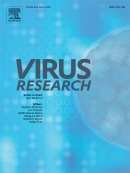Virus Research
Virus Research is a field of biomedical research that focuses on the study of viruses and their properties, including their structure, function, genetics, and interactions with host organisms. This research is crucial for understanding the mechanisms of viral replication, pathogenesis, and immunity, as well as for the development of vaccines, antiviral drugs, and diagnostic methods.
Overview[edit | edit source]
Viruses are microscopic pathogens that can infect all types of life forms, from plants, animals, to microorganisms, including bacteria and archaea. They are characterized by their simple structure, typically consisting of genetic material encased in a protein coat called a capsid, and in some cases, surrounded by a lipid envelope. Unlike cells, viruses do not possess the machinery for cellular respiration or replication; instead, they must infect a host cell and hijack its machinery to reproduce.
Research Areas[edit | edit source]
Virus research encompasses several key areas:
Virology[edit | edit source]
The study of viruses, including their classification, structure, and evolution. Virologists seek to understand how viruses infect their hosts, replicate, and evolve over time.
Molecular Biology[edit | edit source]
This area focuses on the molecular mechanisms of viral replication and gene expression. Researchers study the viral genome and how it interacts with host cellular machinery.
Epidemiology[edit | edit source]
The study of how viruses spread within populations, the factors influencing their transmission, and the impact of viral diseases on public health.
Vaccine and Antiviral Development[edit | edit source]
A critical area of virus research involves the development of vaccines to prevent viral infections and antiviral drugs to treat them. This includes understanding the immune response to viruses and identifying viral targets for therapeutic intervention.
Diagnostic Research[edit | edit source]
Developing accurate and rapid methods for detecting viral infections is another important aspect of virus research. This includes the development of molecular diagnostics and serological assays.
Challenges and Future Directions[edit | edit source]
Virus research faces several challenges, including the emergence of new viral pathogens, the development of resistance to antiviral drugs, and the need for more effective and broadly protective vaccines. Future research will likely focus on understanding the complex interactions between viruses and their hosts, developing novel antiviral strategies, and improving public health responses to viral outbreaks.
See Also[edit | edit source]
Search WikiMD
Ad.Tired of being Overweight? Try W8MD's physician weight loss program.
Semaglutide (Ozempic / Wegovy and Tirzepatide (Mounjaro / Zepbound) available.
Advertise on WikiMD
|
WikiMD's Wellness Encyclopedia |
| Let Food Be Thy Medicine Medicine Thy Food - Hippocrates |
Translate this page: - East Asian
中文,
日本,
한국어,
South Asian
हिन्दी,
தமிழ்,
తెలుగు,
Urdu,
ಕನ್ನಡ,
Southeast Asian
Indonesian,
Vietnamese,
Thai,
မြန်မာဘာသာ,
বাংলা
European
español,
Deutsch,
français,
Greek,
português do Brasil,
polski,
română,
русский,
Nederlands,
norsk,
svenska,
suomi,
Italian
Middle Eastern & African
عربى,
Turkish,
Persian,
Hebrew,
Afrikaans,
isiZulu,
Kiswahili,
Other
Bulgarian,
Hungarian,
Czech,
Swedish,
മലയാളം,
मराठी,
ਪੰਜਾਬੀ,
ગુજરાતી,
Portuguese,
Ukrainian
Medical Disclaimer: WikiMD is not a substitute for professional medical advice. The information on WikiMD is provided as an information resource only, may be incorrect, outdated or misleading, and is not to be used or relied on for any diagnostic or treatment purposes. Please consult your health care provider before making any healthcare decisions or for guidance about a specific medical condition. WikiMD expressly disclaims responsibility, and shall have no liability, for any damages, loss, injury, or liability whatsoever suffered as a result of your reliance on the information contained in this site. By visiting this site you agree to the foregoing terms and conditions, which may from time to time be changed or supplemented by WikiMD. If you do not agree to the foregoing terms and conditions, you should not enter or use this site. See full disclaimer.
Credits:Most images are courtesy of Wikimedia commons, and templates Wikipedia, licensed under CC BY SA or similar.
Contributors: Prab R. Tumpati, MD

